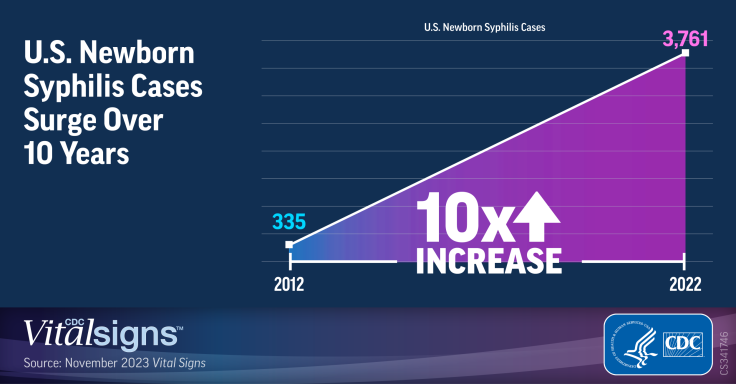
There is a surge in newborn syphilis in the U.S., and Black, Hispanic, American Indian and Alaska Native mothers are feeling the brunt of the impact. Otherwise known as "Congenital Syphilis," it results from the perinatal transmission of syphilis, meaning that it is passed onto the baby while the mother is pregnant.
The Centers for Disease Control and prevention released a media statement urging the implementation of concerted actions to stop the increase of newborn syphilis cases and continued attention to the consequences of a rapidly accelerating epidemic of sexually transmitted infections in the U.S.
The statement details that newborn syphilis can result in miscarriage, stillbirth, infant death and lifelong medical issues. It adds that this occurs when mothers who contracted the disease do not receive timely testing and treatment during pregnancy.
The CDC also said in its statement that Black, Hispanic, and American Indian or Alaska Native mothers were eight times more likely to have newborn syphilis in 2021 than babies born to White mothers.
These disparities, the CDC said, stem from decades of social determinants of health that create greater obstacles to quality healthcare services and result in inequities such as higher rates of syphilis in some communities. The CDC said community health workers such as local patient navigators, case managers and disease intervention specialists can be critical to developing strategies to address the issue.
"The congenital syphilis crisis in the United States has skyrocketed at a heartbreaking rate," said CDC Chief Medical Officer Debra Houry, M.D., M.P.H. in the statement. "New actions are needed to prevent more family tragedies. We're calling on healthcare providers, public health systems, and communities to take additional steps to connect mothers and babies with the care they need."

The CDC said that barriers to access timely treating can be due to individual-level barriers such as lack of health insurance or drug use, but also to system-level barriers which could be a result of systemic racism and limited healthcare access. Cases of congenital syphilis in the U.S. have increased by 755 percent since 2012.
The report said that lack of timely testing and adequate treatment during pregnancy contributed to 88 percent of cases of newborn syphilis. Testing and treatment gaps were present in the majority of cases across all races, ethnicities and U.S. Census Bureau regions, the report said.
The effects of limited healthcare access are echoed in the Hispanic community with a recent 2023 U.S. Census Bureau report showing Hispanics are the group least likely in the U.S. to have health insurance, with 22.4 percent of this demographic lacking health insurance coverage, compared to only 6.8 percent White people.
© 2025 Latin Times. All rights reserved. Do not reproduce without permission.




